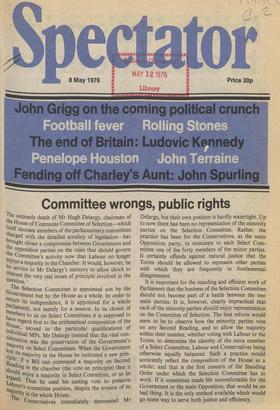Committee wrongs, public rights
The untimely death of Mr Hugh Delargy, chairman of t.he House of Commons Committee of Selection—which itself chooses members of the parliamentary committees charged with the detailed scrutiny of legislation—has brought closer a compromise between Government and tihe opposition parties on the rules that should govern tri.! Committee's activity now that Labour no longer enJoYs a majority in the Chamber. It would, however, be no service to Mr Delargy's memory to allow shock to obscure the very real issues of principle involved in the question.
G The Selection Committee is appointed not by the "ernment but by the House as a whole. In order to ensure its independence, it is appointed for a whole Parliament, not merely for a session. In its choice of ,Mernbers to sit on Select Committees it is supposed to htiave regard first to the arithmetical composition of the • °11. se; second to the particular qualifications of Individual MPs. Mr Delargy insisted that the vital conside.ration was the preservation of the Government's iilla"ritY on Select Committees. When the Government coiPi st Its majority in the House he instituted a new prinRe:. if a Bill can command a majority on Second sheading in the chamber (the vote on principle) then it a r °uld enjoy a majority in Select Committee, or so he g,tledThus he used his casting vote to preserve our's aprity committee position, despite the erosion of its in the whole House. rhe Conservatives immediately denounced Mr Delargy, but their own position is hardly watertight. Up to now there has been no representation of the minority parties on the Selection Committee. Rather, the practice has been for the Conservatives, as the main Opposition party, to nominate to each Select Committee one of the forty members of the minor parties. It certainly offends against natural justice that the Tories should be allowed to represent other parties with which they are frequently in fundamental disagreement.
It is important for the standing and efficient work of Parliament that the business of the Selection Committee should not become part of a battle between the two main parties. It is, however, clearly impractical that each of the minority parties should enjoy representation on the Committee of Selection. The best reform would seem to be to observe how the minority parties vote on any Second Reading, and to allow the majority within their number, whether voting with Labour or the Tories, to determine the identity of the extra member of a Select Committee, Labour and Conservatives being otherwise equally balanced. Such a practice would accurately reflect the composition of the House as a whole; and that is the first concern of the Standing Order under which the Selection Committee has to work. If it sometimes made life uncomfortable for the Government or the main Opposition, that would be no bad thing. It is the only method available which would go some way to serve both justice and efficiency.


































